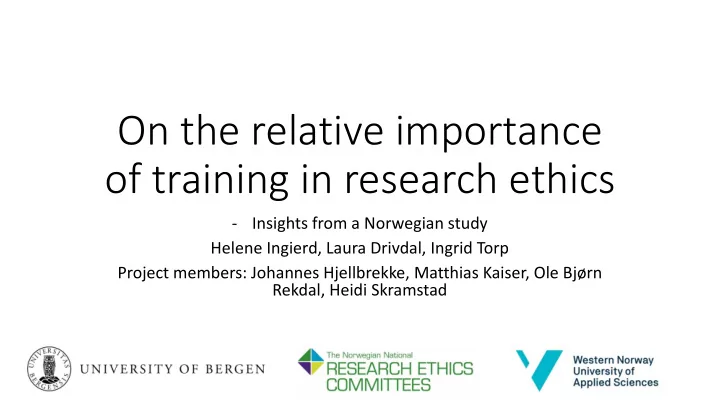

On the relative importance of training in research ethics ‐ Insights from a Norwegian study Helene Ingierd, Laura Drivdal, Ingrid Torp Project members: Johannes Hjellbrekke, Matthias Kaiser, Ole Bjørn Rekdal, Heidi Skramstad
The Norwegian System for Research Ethics The Research Ethics Act (2017) § 5: Research institutions are responsible for: a) necessary training of candidates and employees in recognised norms of research ethics, and b) ensuring that everyone who conducts or participates in the research is familiar with recognised norms of research ethics.
The RINO ‐ project • Quantitative part : Survey sent to scientists in Norway (31 206). 7 291 replied. 36,8% had not attended any course. • Qualitative part: 3 focus group interviews + 12 individual interviews
Concepts and focus of the study Concepts in research ethics training literature ‐ Formal vs informal ‐ Principle ‐ based vs virtue ‐ based Focus of our analysis: 1) Formal training and knowledge of research ethical guidelines 2) How knowledge of principles / norms for ‘good scientific practice’ is generated: formally and informally 3) The relevance of formal and informal training
(1) Formal training and knowledge of guidelines(survey) Have you participated in any course on research ethics? Are you familiar with research ethical No, never Yes, a course Yes, a course Yes, several Total guidelines (Norwegian or international) lasting one lasting more courses (either within your field of expertise? day or less than one day short or long) I have no knowledge of this. 6,8 1,4 0,9 0,9 3,2 I have some knowledge of this. 61,6 50,3 45,7 14,1 47,5 I am well informed on this matter . 31,6 48,3 53,4 85,0 49,3 Total 100 100 100 100 100 (n=2674) (n=1711) (n=1692) (n=1176) (n=7253)
(2) Learning principles / norms for ‘good scientific practice’: fo formal and in inform rmal training 1) Formal training Junior researchers highlighted research ethics courses 2) Informal training a): Role models ‐ colleagues and supervisors: “In my generation, you learned it through supervisors and colleagues. It is a culture you enter into and then you learn that culture» (social scientists at old university) “It was through colleagues and collaborators that I learned who has actually done enough, and what it requires to be a co ‐ author of a scientific work” (natural scientist at research institute) 3) Informal training b): Learning by doing “I did research on an authoritarian regime, so I became more aware of that this [research ethical regulations] was not just a ritual dance in front of a committee, but it was actually a matter of people’s safety” (social scientist at young university)
(3) The relevance of fo formal tr train aining ng How courses should be organized 1) When? Also after gaining research experience 2) Mandatory or voluntary? Mandatory but integrated in other activities 3) By whom? Engage researchers rather than delegating to administrative staff What courses should contain 1) Reflections of why research ethics matter – quality in science and trust society 2) General vs field ‐ specific courses 3) Principles and discussions of experiences and cases “…when I was presented to research ethical principles, I thought, this is of course very important, but then you don’t really manage to reflect upon the principles until you are in a situation where you see that it is actually difficult … But we did get good training through different cases. That was very educational, even if the cases are very different from the situations you meet yourself… it was the thought ‐ process of how to solve ethical dilemmas that was useful to learn ” (mathematician at young university)
(3) The relevance of in inform rmal tr trainin aining 1) Positive role models «And my supervisor, he didn’t have any focus on research ethics explicitly, but he was a living example, so to speak, of ethical behavior…» (senior economist at young university) 2) Open work environment «Perhaps it is more important that there is culture for research ethics, than a course, where one is formed and there is room for formation and where you learn to think in a certain way…» (mathematician at young university)
Conclusions/recommendations • Formal and informal training may be mutually reinforcing • Good formal training should include both principle ‐ based and virtue ‐ based approaches • Good informal training requires an open work environment and positive role models
Organisation of RINO Working group Reference group Managing group Jan Helge Solbakk (Professor, Centre for • Professor Matthias Kaiser (UiB) Head of Human Relations Torunn • Medical Ethics, UiO) (Principal Investigator) Ellefsen (FEK) Aslaug Nyrnes (Professor, Senter for • kunnskap, kultur og kom, HVL) Pro ‐ rector Margareth Hagen (UiB) Professor Ole Bjørn Rekdal (HVL) • Torkild Vinther (Director, The National • Commission for the Investigation of Research Pro ‐ rector Gro Anita Fonnes Flaten Director Helene Ingierd (FEK) • Misconduct ) (HVL) Vidar Enebakk (Director, The Norwegian • Research Advisor Heidi Skramstad National Research Ethics Committee for the Social Observer: Sciences and the Humanities ) (HVL) (secretary) Anne Marit Blokhus (Professor, Department • Professor Matthias Kaiser (UiB) of Chemistry, UoB) Professor Johs Hjellbrekke (UiB) (Principal Investigator) Kristin Hinna ( The Norwegian Association • Researcher Lise Augustson (UiB) (2016 ‐ of Researchers and HVL) Secretary: 2017) Ole ‐ Andreas Rognstad (Professor, • Research Advisor Heidi Skramstad Department of Private Law, UiO) Researcher Laura Elisabet Drivdal (UiB) (HVL) Ingrid Ballo ( PhD Candidate , Department of • Geography, UoB) Communications Officer Ingrid Synnøve Svein Nordenson (Retired. Former SINTEF, The • Norwegian National Research Ethics Committee Torp (FEK) (since 2017) for Science and Technology, The Association of Norwegian Research Institutes (FFA))
Thank you! helene.ingierd@etikkom.no laura.drivdal@uib.no Ingrid.torp@etikkom.no www.uib.no/rino www.etikkom.no/en
Recommend
More recommend